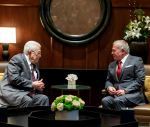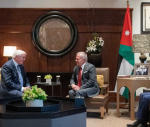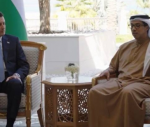You are here
Military transparency and Asian security
Jul 08,2014 - Last updated at Jul 08,2014
We have all heard the saying, “Sunshine is the best disinfectant”. That is particularly true where Asian security is concerned.
Indeed, I believe that a framework under which Asian governments publicly disclose their military budgets needs to be established if we are to build trust and avoid a regional arms race.
More broadly, keeping military expansion in check, enlarging the number of countries that conclude the Arms Trade Treaty and improving mutual understanding among national defense authorities are now the paramount issues facing Asia.
They should be the focus of the East Asia Summit, which in turn should become the premier forum for taking up regional security issues and ensuring that stability is maintained.
Military expansion is inherently incompatible with Asia’s move toward the centre of the global economy. The fruits of prosperity should be reinvested in improving people’s lives, not in weapons that can take them.
And yet safeguarding the rule of law counts most. For example, Japan will offer its utmost support for efforts by ASEAN member countries to ensure the security and free navigation of the seas and skies.
But let me be transparent about what Japan will actually support, and how.
We have already provided three new patrol vessels to Indonesia through grant aid cooperation and have decided to provide ten more to the Philippine Coast Guard. Moreover, we are moving forward with the necessary survey to enable us to provide such vessels to Vietnam.
No less important, when Japan sends hardware, experts and training follow, and we convey our sense of pride in committing ourselves to our duties.
By cultivating a high degree of morale and proficiency, we strengthen the bonds between the peoples of Japan and recipient countries.
In the Philippines, Indonesia and Malaysia alone, Japan has trained more than 250 coast guard personnel. In 2012, when we invited senior officials responsible for enforcing maritime law in each of the five major ASEAN countries to a month-long training programme, three members of the Japan Coast Guard were assigned to each trainee, with all of them living, eating and sleeping together under the same roof.
Recently, Japan formulated a new framework for transfers of defence equipment and technology to other countries.
On the basis of appropriate controls and strict inspections, we can now offer rescue, transport, surveillance and minesweeping equipment.
To support ASEAN countries in safeguarding the seas, Japan will combine various options, including official development assistance, capacity building by the Japan Self-Defence Forces (JSDF), and provision of defence equipment and technology.
No country can secure its own peace alone anymore. That is why it is incumbent upon us in Japan to reconstruct the legal basis for collective self-defence and international cooperation, including participation in United Nations peacekeeping operations — a reform that my administration has begun.
The importance of this reform can hardly be overstated. The JSDF is now working to foster peace in South Sudan, under the flag of the UN mission there, alongside units from Cambodia, Mongolia, Bangladesh, India, Nepal, the Republic of Korea and China, as well as many civilian UN staffers and NGO personnel from various countries. All are partners with us in assisting South Sudan’s nation-building process.
But imagine now that civilian workers there, powerless to defend themselves, came under sudden attack by armed elements. Under the approach that Japanese governments have taken up to now, the JSDF would be unable to rescue the civilians. Is this really an appropriate response?
My government is thinking hard about this dilemma and close consultation is under way within the ruling coalition. It is precisely because Japan depends so heavily on the international community for the stability of its external environment that we wish to work even more proactively for world peace.
Many generations of Japanese have walked a single path — that of freedom, human rights and the rule of law — and we will continue to walk this path for generations to come.
But, as we revitalise Japan’s economy, we need “new” Japanese who shoulder global responsibilities commensurate with their country’s size and economic resources.
These new Japanese will lose none of their good qualities. They will still loathe poverty, embrace universal values and find joy in hard work.
If anything has changed, it is that women are much more visible among these new Japanese. For example, all three of the Japanese judges and public prosecutors who helped draft Cambodia’s civil code were young women.
The new Japanese will actively serve the cause of Asian peace. In August 2011, President Benigno Aquino III of the Philippines and Chairman Murad Ebrahim of the Moro Islamic Liberation Front met in Narita, Japan.
Three months ago, in March, the two sides finally reached a comprehensive peace agreement. When the new Bangsamoro local government assumes power two years from now, Japanese assistance teams will be there from the start.
Japan is already focusing on giving women in the region the skills they need to earn a living. In Mindanao, where Japan built a vocational training centre for women, the sounds of gunshots and angry cries have been replaced by the whir of sewing machines.
All of this is nothing other than an expression of Japan’s determination to spare no effort for the sake of peace, security and wider prosperity in the Asia-Pacific region.
By working with our regional allies and partners, including the United States and ASEAN, we will translate that determination into a rock-solid zone of stability.
The writer is Prime minister of Japan. ©Project Syndicate, 2014. www.project-syndicate.org












